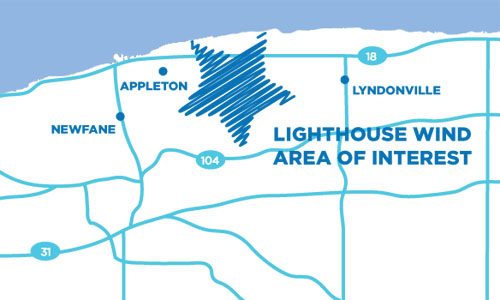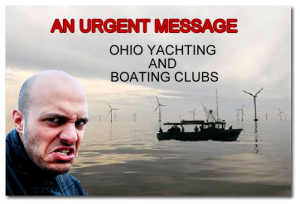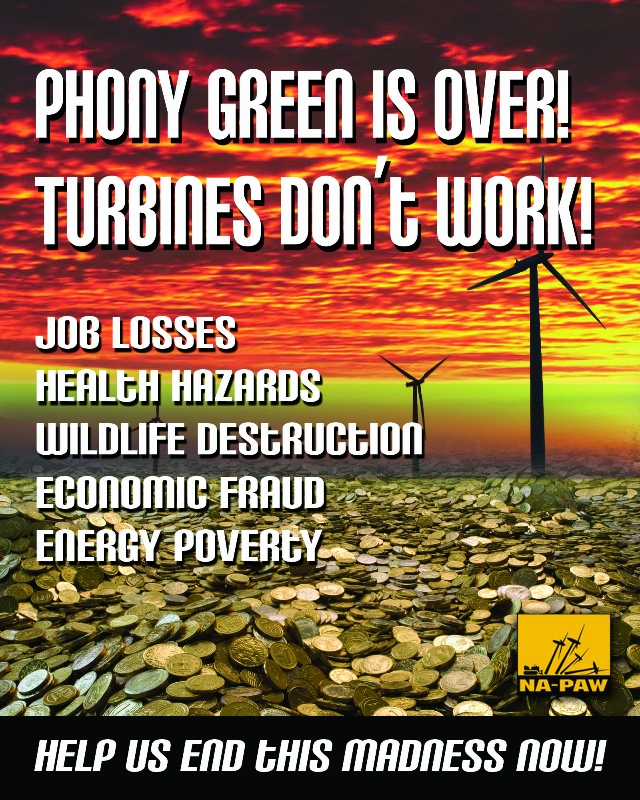BARKER — Area residents relinquished an idyllic Wednesday evening by packing Barker Fire Hall, concern and inquisitiveness sending them indoors to hear a presentation by Save Ontario Shores, a group opposing wind energy.
Al Isselhard commenced the meeting by naming three objections to Apex Clean Energy corporation’s designs for nearly 70 industrial turbines on the nearby farmland.
“Residents in other states who live near wind turbines have suffered,” he began as he spoke to the nearly two hundred people in attendance. “Alarming health issues, the decline of property values, and the improbability of properly decommissioning the massive turbines are questions that must be answered.”
Isselhard went on to detail headaches, sleep disruption and the detriment to wildlife as some of the consequences of turbine operation.
“I was born and raised in Somerset,” Jill Harrod said as she sat in the audience with her young husband, Joel. “We left for school, but came back home; back to the place that is so special to us.”
Mrs. Harrod smiled as she described the quality of people and the peaceful farms, as well as how much she cherishes the scenery of the shores of Lake Ontario.
“But I suffer from migraine headaches and have to be careful with bright lights and loud noises,” she said. “The turbines are truly concerning me.”
Isselhard continued, numbering the death rates for birds and bats via whirling enormous blades, their blood dirtying wind energy’s hands.
“Despite them repeating it, this is not ‘clean’ energy!” he said.
Isselhard also questioned claims that underground cables leading away from the turbines would have no effect on livestock when radio and television interference is high.
“In the future, if you are unhappy after inviting these things into your community, who will mitigate the problems? It won’t be your government,” he said. “You could leave town, but may not be able to sell your home.”
Suzanne Albright took the podium next, focusing on citizens who signed similar lease agreements elsewhere only to find they had signed away control of their land in many ways. An Apex agreement she acquired and quoted seemed to substantiate these claims. She cited contractual phrases limiting Apex’s liability, startling the audience with her claim that land near a turbine would be “an insurance nightmare.” Her voice was emphatic: “Homes near turbines are cancelled or are forced to pay elevated rates.”
Albright further suggested that contractual provisions were unusually slanted, all extremely advantageous to Apex.
The crowd, consisting of both young adults and the elderly, listened intently, taking notes and calling Albright on a single slipped word that did not match her material.
“No one would describe this lease as fair if they took the time to read it,” she concluded.
“What amount of money would leave you agreeable to this?” this correspondent asked a man in his 50s who did not want to be identified.
“This isn’t about the money,” he said. “They aren’t being upfront with us. They lie to us and think we will skip researching what they are doing. If they were so wonderful and honest, wouldn’t you see a few yard signs saying ‘I signed a land contract with Apex’?”
I had to agree that I had not driven past any such signs, while I did see many yellow ones saying, “Too Big Too Close.”
Cathi Orr spoke next, sharing her negative experience with turbines in Wyoming County by focusing on diminished property values.
“A home next to a turbine will not hold the value that a property without it would enjoy. The reduction can slip from 30 to 50 percent,” she said.
Orr also described the damage that the heavy equipment inflicted on local roads, harm that she claimed was not made whole by the turbine company.
Glenn Maid was the last SOS speaker, who pitched the entire process as a money-grab: not a “green energy project” but an arrangement that could not succeed without being artificially propped up by government aid.
“This is nothing but an unholy alliance between government and large corporations,” Maid said. “Misleading promises give wind energy neighbors the impression that tax money and utility benefits will be enjoyed, but be wary. That does not happen.”
Maid described different scenarios where the turbine complex is either sold or devalued after government incentives are gone, leaving local towns in an economic quandary.
Two hours after opening, the fire hall was still full of upset residents visualizing the wrecking of their hometown. Wind turbines seemed an unlikely candidate to join the “not in my backyard” family of unwanteds such as hazardous waste landfills and nuclear power, yet the environmental group SOS had attacked wind power from many angles. The crowd, who knew each other by name, seemed to have reached an opinion before arriving and their skepticism was only strengthened by the end of the meeting.
Maid concluded the presentation by directing audience members to action in the form of writing to the developers and their senators, and by electing like-minded officials to local office.
“You will be heard!” he insisted. “Don’t be afraid to speak out.”





